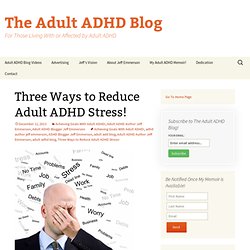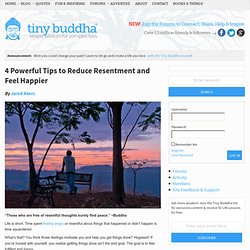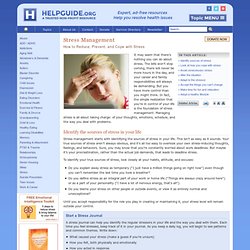

How to Prevent Stress from Shrinking Your Brain. Corticosteroids and The Brain Have you ever felt so stressed out and overwhelmed that you can’t think straight? We now know that prolonged stress or trauma is associated with decreased volume in areas of the human brain responsible for regulating thoughts and feelings, enhancing self-control , and creating new memories . A new research study, published in today’s issue of is a first step in uncovering the genetic mechanism underlying these brain changes. In this study, conducted by Professor Richard Dumin and colleagues from Yale University, scientists compared the genetic makeup of donated brain tissue from deceased humans with and without major depression .
Only the depressed patients’ brain tissues showed activation of a particular genetic transcription factor, or “switch.” The stress response involves activation of a brain region known as the amygdala, which sends a signal alerting the organism to the threat. {*style:<b> Stop stress from driving you crazy... Summary About the Author. Three Ways to Reduce Adult ADHD Stress! These are keys to relief from Adult ADHD symptoms!

– Jeff Emmerson By Jeff Emmerson I’m happy to share three keys to a calmer life with Adult ADHD that have worked incredibly well for me! Let’s get right to these tools: Learn to Let Go and Live in the Moment! This single tool literally changed my life recently! Start Every Day With a Sense of Gratitude! A powerful reminder, regardless of what is happening in your life! When we start each and every day in a good, grateful mindset regardless of what is happening in our lives, we approach everything and everyone with a better, gentler attitude. Pay Attention to Your Breathing Every Day!
Talk about an instantly calming tool that literally changes us any moment of the day! These tools have literally changed my life. **Please help me spread the word about this blog! Like this: Like Loading... Robert Sapolsky discusses physiological effects of stress. Lisa Share Robert Sapolsky carries a tranquilized baboon.

Why do humans and their primate cousins get more stress-related diseases than any other member of the animal kingdom? The answer, says Stanford neuroscientist Robert Sapolsky, is that people, apes and monkeys are highly intelligent, social creatures with far too much spare time on their hands. "Primates are super smart and organized just enough to devote their free time to being miserable to each other and stressing each other out," he said.
"But if you get chronically, psychosocially stressed, you're going to compromise your health. A professor of biological sciences and of neurology and neurological sciences, Sapolsky has spent more than three decades studying the physiological effects of stress on health. Stress response All vertebrates respond to stressful situations by releasing hormones, such as adrenalin and glucocorticoids, which instantaneously increase the animal's heart rate and energy level. Baboon studies New research. 4 Powerful Tips to Reduce Resentment and Feel Happier. “Those who are free of resentful thoughts surely find peace.”

~Buddha Life is short. Time spent feeling angry or resentful about things that happened or didn’t happen is time squandered. What’s that? You think those feelings motivate you and help you get things done? Accomplishments fueled by resentment and anger seldom contribute to serenity and fulfillment. Resentment is like a cancer that eats away at time—time which could have been filled with love and joy. Here are four powerful tips to reduce resentments and live a happier life. 1. You’re probably thinking, “You can’t be serious.” What’s the opposite of anger, hate, or fear? Whether or not you believe in prayer, you can still set aside time during the day to think loving thoughts about someone you resent, wishing them good fortune and blessings. At first it will most likely feel awkward and meaningless, not to mention difficult.
A good rule of thumb for this exercise is trying it every day for at least for fourteen days. 2. How to Reduce, Prevent, and Cope with Stress. Identify the sources of stress in your life Stress management starts with identifying the sources of stress in your life.

This isn’t as easy as it sounds. Your true sources of stress aren’t always obvious, and it’s all too easy to overlook your own stress-inducing thoughts, feelings, and behaviors. Sure, you may know that you’re constantly worried about work deadlines. But maybe it’s your procrastination, rather than the actual job demands, that leads to deadline stress. To identify your true sources of stress, look closely at your habits, attitude, and excuses: Do you explain away stress as temporary (“I just have a million things going on right now”) even though you can’t remember the last time you took a breather?
Until you accept responsibility for the role you play in creating or maintaining it, your stress level will remain outside your control. Stress Symptoms, Signs & Causes: Effects of Stress Overload. What is stress?

The Body’s Stress Response When you perceive a threat, your nervous system responds by releasing a flood of stress hormones, including adrenaline and cortisol. These hormones rouse the body for emergency action. Your heart pounds faster, muscles tighten, blood pressure rises, breath quickens, and your senses become sharper. These physical changes increase your strength and stamina, speed your reaction time, and enhance your focus—preparing you to either fight or flee from the danger at hand. Stress is a normal physical response to events that make you feel threatened or upset your balance in some way. The stress response is the body’s way of protecting you. The stress response also helps you rise to meet challenges.